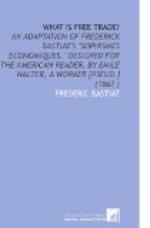The RAW-MATERIALIST: “Come, let the wool go too. But coal is assuredly the work, and the exclusive work, of Nature, unaided by any human labor.”
The PROTECTIONIST: “Yes, Nature made coal, but labor makes its value. Coal had no value during the thousands of years during which it was hidden, unknown, a hundred feet below the soil. It was necessary to look for it there—that is a labor: it was necessary to transport it to market; that is another labor: and once more, the price which you pay for it in the market is nothing else than the remuneration for these labors of digging and transportation.”
We see that thus far the protectionist has all the advantage on his side; that the value of raw material, as well as that of manufactured material, represents the expense of production, that is to say, of labor; that it is impossible to conceive of a material possessed of value while totally unindebted to human labor; that the distinction which the raw-materialists make is wholly futile, in theory; that, as a basis for an unequal division of favors, it would be iniquitous in practice; because the result would be that one-third of the people, engaged in manufactures, would obtain the sweets of monopoly, for the reason that they produced by labor, while the other two-thirds, that is to say the agriculturists, would be abandoned to competition, under pretext that they produced without labor.
It will be urged that it is of more advantage to a nation to import the materials called raw, whether they are or are not the product of labor, and to export manufactured articles.
This is a strongly accredited opinion.
“The more abundant raw materials are,” said the petition from Bordeaux, “the more manufactories are multiplied and extended.” It said again, that “raw material opens an unlimited field of labor to the inhabitants of the country from which it is imported.”
“Raw material,” said the other petition, that from Havre, “being the aliment of labor, must be submitted to a different system, and admitted at once at the lowest duty.” The same petition would have the protection on manufactured articles reduced, not one after another, but at an undetermined time; not to the lowest duty, but to twenty per cent.
“Among other articles which necessity requires to be abundant and cheap,” said the third petition, that from Lyons, “the manufacturers name all raw material.”
This all rests on an illusion. We have seen that all value represents labor. Now, it is true that labor increases ten-fold, sometimes a hundred-fold, the value of a rough product, that is to say, expands ten-fold, a hundred-fold, the products of a nation. Thence it is reasoned, “The production of a bale of cotton causes workmen of all classes to earn one hundred dollars only. The conversion of this bale into lace collars raises their profits to ten thousand dollars; and will you dare to say that the nation is not more interested in encouraging labor worth ten thousand than that worth one hundred dollars?”




